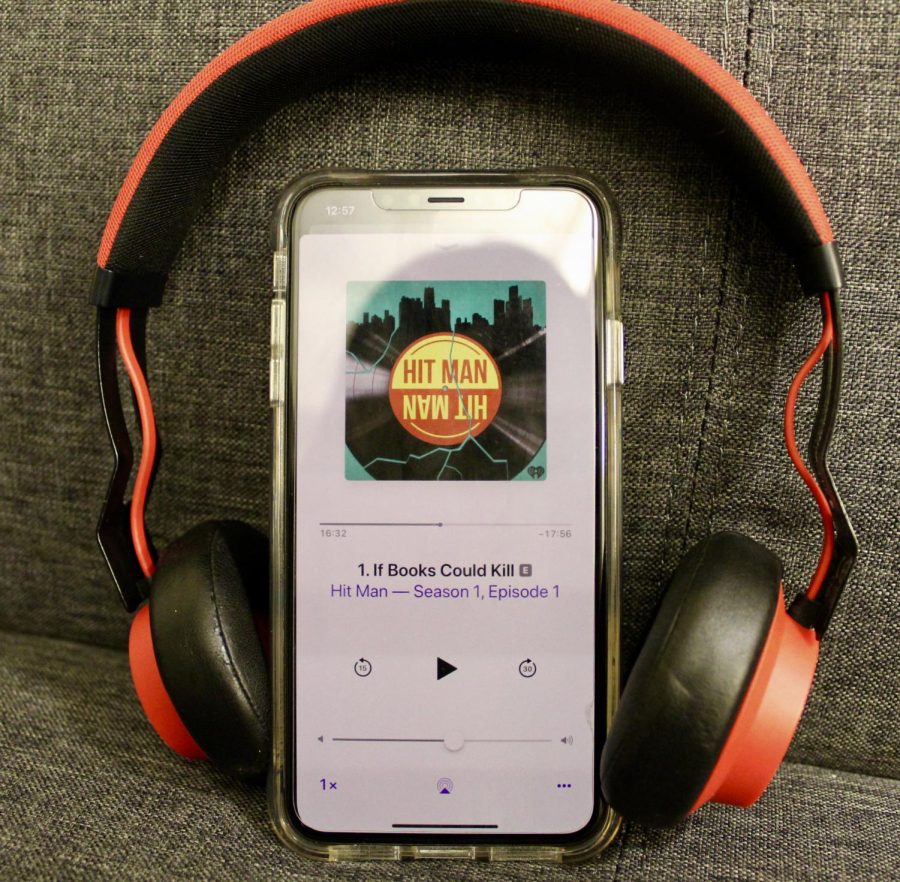If books could kill: A podcast review
The podcast Hit Man being played through red headphones.
If someone gives someone advice on killing someone and getting away with it, are they responsible for any murders committed using the advice? This is the theme of the podcast called Hit Man, researched and hosted by awarded journalist Jasmyn Morris. In 1983, a book called Hit Man: A Technical Manual for Independent Contractors was published.
The author of the gruesome read is Rex Feral, which is obviously a pseudonym. This pseudonym gives outsiders a glimpse into the mind of the author of this unsettling novel. The last name ‘Feral’ indicates that the author wanted to be regarded as dangerous and wild. This begs the question: was this author actually a menace to society? If police dug through their cold cases, would they find crimes that fit the detailed advice in this manual? Or was this author speaking on a topic beyond themselves and used an overly-dramatic name in attempts to assert themselves?
The Wikipedia page dedicated to this book says it is in the non-fiction genre. This implies that the manual was not intended as a joke or as a fictitious story. Based on this, could one argue that the manual was intended to help someone take a human life? Or was it simply intended as a collection of information, as Feral stated in an anonymous interview? Feral said that he would feel no guilt if someone used his manual to kill a person, as it wouldn’t be his fault if someone decided to misuse the information he had compiled.
While the name of this podcast pays homage to the book, the content is dedicated to a story that is heart-wrenching. In the early 1990s, triple-homicide was committed. The victims were a mother, her disabled son, and the nurse that was caring for the boy overnight. The killer left remarkably little evidence at the scene of the crime. Following a raid on a suspect’s home, police discovered that the suspect owned a copy of the novel Hit Man: A Technical Manual for Independent Contractors. The triple-homicide mirrored advice given in the manual a chilling number of times.
However, many will guess right away that the suspect did not act alone. After all, he had no direct connection to the family and no likely motive. He was simply a man who had been in the area on the night of the murder and had no reason to be, nor did he have an alibi. If the suspect was, as the manual found in his home implied, a hitman, that means he must have been hired by someone else to do the killing. To find out who would kill a mother, her disabled child, and the nurse that was caring for him, listen to the podcast Hit Man.
The moral dilemma that this book raises may feel unsettlingly familiar to some. I would argue that there are distinct similarities between the dialogue around the ethics of this manual being readily available to the public and the ethics of guns being readily available in America. Both can be dangerous, even deadly, when placed into the hands of someone who is mentally unstable. Neither can cause deaths without being used by a human.
This podcast is upsetting at times. I would advise anyone who suffers from nervousness or paranoia to reconsider before listening to this podcast. For those with nerves of steel, this saddening tale is worth listening to. Heartbreaking, shocking, and real, Hit Man is a podcast that will fill listeners with questions, cause moral dilemmas, and keep people up at night.


